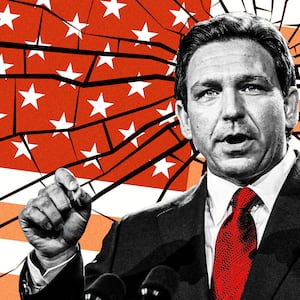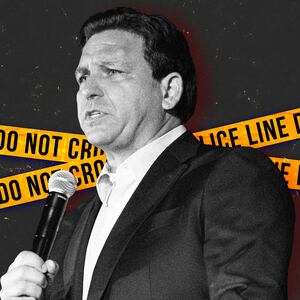Ron DeSantis wants you to be worried about crime. The Florida governor has apparently decided that the only way to peel primary voters away from Donald Trump is to be more Trump than Trump. So in truly Trumpian fashion, DeSantis is attacking Trump for the most competent thing the former president did—expediting approval of the COVID vaccine—and the most decent, the First Step Act.
Crime has been Trump’s pet issue since he launched his first campaign. It's an issue he returns to over and over. In his grim “American Carnage” inaugural address, Trump began his presidency with a grotesque vision of a country ravaged by violence.
It wasn't accurate—Trump inherited the lowest homicide rate of any president in 50 years. Perhaps it was aspirational. He was also the first president in 30 years to leave the White House with a higher national homicide rate than when he entered it.
DeSantis appears to be following the same playbook. The policies DeSantis is pushing haven’t mitigated crime in Florida. The state has mostly followed national trends. But when you’re trying to out-Trump Trump, you don’t bother with facts, data, or reality. Your weapon is fear.
We can start with the First Step Act, Trump’s uncharacteristically hopeful and optimistic criminal justice reform bill (which, naturally, he later regretted). DeSantis recently called the law a “jailbreak bill” that “allowed dangerous people out of prison who have now re-offended, and really, really hurt a number of people.”
There's no evidence for any of this. If a significant number of prisoners released under the FSA have gone on to commit new violent or sex crimes, we'd know their names. Their photos would be on the cover of the New York Post, their names emblazoned in Fox News chyrons. So far, the best they can do is Glynn Neal, a man who stabbed a staffer from Sen. Rand Paul’s office shortly after his release from prison.
But Neal would have been released without the FSA. The new law reduced his sentence by a matter of days. I asked the DeSantis campaign for other examples. They did not respond to my request.
In fact, the vast majority of prisoners released early under the FSA would have been released anyway. In most cases, like Neal’s, the law merely expedited their release by a few weeks or months.
Repealing the First Step Act will actually result in more crime. The thrust of the bill—and most of its funding—is geared toward data-proven programs shown to reduce recidivism. And here the First Step Act has been an unqualified success. The overall recidivism rate among federal prisoners is 43 percent. For those who have benefitted from FSA programs, it's about 16 percent.
Again, the overwhelming majority of those released under the FSA who would have been released even without the law. But their rate of reoffending dropped by two-thirds.
If DeSantis succeeds in repealing the FSA, it seems logical that the recidivism rate among those who would have benefitted from the law will go back to what it is for federal prisoners in general. And that means more crime, not less.
DeSantis is also one-upping Trump on immigration.
Trump sought to punish “sanctuary cities,” despite warnings from police chiefs and groups like the International Association of Chiefs of Police that vigorous enforcement would result in immigrants fearing police, which would lead to less cooperation, which would lead to more crime. Trump waged federal raids in many of those cities anyway. As predicted, trust between immigrant communities and police in those cities broke down, those communities were less willing to cooperate with police, and that brought more crime.
DeSantis hasn’t just exploited anti-immigrant bigotry, he’s managed to be even more performatively cruel about it than Trump, with his much-publicized stunts of luring desperate migrants in Texas onto planes, then dropping them off in other parts of the country—all funded by Florida taxpayers.
DeSantis has also borrowed from Trump’s attempt to weaponize state power. Trump believed federal law enforcement agencies ought to be his personal enforcers. He pushed the FBI and other agencies to investigate and arrest his enemies and of course famously fired FBI director James Comey for refusing to take a loyalty oath. Trump also tried to enlist the Justice Department, the Department of Homeland Security, and then even the Pentagon to help him overturn the 2020 election.
Not only has DeSantis not condemned Trump for any of that, he has explicitly criticized those agencies for rebuffing Trump's attempts to corrupt them, and has promised that as president, he’d be better at coercing them to do his bidding.
As governor, DeSantis has already demonstrated his commitment to corrupting law enforcement. Earlier this year he forcibly removed a state’s attorney—Andrew Warren—from office. Warren was among the new breed of progressive prosecutors who “take it upon themselves to determine which laws they like and will enforce and which laws they don’t like and won’t enforce,” DeSantis said, “and the results of this in cities like Los Angeles and San Francisco have been catastrophic.”
Here, too, reality doesn't support DeSantis’ rhetoric.

Sen. Rand Paul, R-Ky., speaks during the Senate Homeland Security and Governmental Affairs Committee hearing on the president's proposed budget request for fiscal year 2024 for the Department of Homeland Security in the Senate Dirksen Office Building on Tuesday, April 18, 2023.
Bill Clark / GettyThe murder rate in San Francisco is significantly lower than that of the entire state of Florida—an incredible statistic, given that crime is usually more concentrated in cities. The murder rate in Los Angeles is significantly lower than major Florida cities like Miami and Tallahassee. And Jacksonville has consistently had the highest murder rate in the state, despite a series of Republican mayors and lead prosecutors.
DeSantis has also repeated the Republican line that crime has soared in blue cities because of “woke” criminal justice policy. That too just isn’t true. In 2020 and 2021, the homicide rate in GOP whipping boy cities like New York and San Francisco was lower than that of nearly every large Republican-run city, including Omaha, Fresno, Tulsa, Colorado Springs, and Oklahoma City.
As for Tampa, the murder rate did go up under Warren’s watch in 2020 and 2021. But it went up just about everywhere. The city still has a lower murder and overall crime rate than nearby St. Petersburg, which has a Republican prosecutor.
In March, a daming New York Times investigation showed just how phony and staged DeSantis’ removal of Warren really was. DeSantis had asked staff to bring him statistics showing that Warren’s policies had contributed to an increase in crime. But his staff couldn't find any such data. That didn’t stop DeSantis from making the accusation, anyway. He just removed the passage from his announcement where he planned to cite statistics. In other words, Warren’s removal was nakedly political.
During the 2020 protests after the murder of George Floyd, Trump sent militarized federal police to cities around the country to break the will of protesters, and despite what the right would like you to think, his administration violently cleared peaceful protesters from a D.C. park so Trump could stage a photo op at a church while clutching a Bible.
DeSantis has shown a willingness to weaponize law enforcement for photo-ops, too. He sent Florida cops out to arrest citizens he alleged had committed “voter fraud”—people who, it turns out, were legitimately confused about the law, and had actually been encouraged by state officials to register to vote. So far, none of those arrests have held up, and some of the law enforcement officials sent to make the arrests seemed embarrassed for participating in the charade.
Donald Trump gave red meat speeches to friendly law enforcement groups, during which he made light of and essentially endorsed police brutality. DeSantis learned from that, too. In the lead-up to the launch of his campaign, DeSantis gave a series of speeches to law enforcement crowds in New York in which he blamed policies like bail and police reform for the city's crime.
Here, too, DeSantis has little data to back up his claims. Like San Francisco, New York City has lower rates of both violent and property crime than the entire state of Florida—again, a remarkable statistic given that more population density tends to correlate with more crime.
If we compare the entire states, the discrepancy only grows. The overall homicide rate in Florida is about 50 percent higher than that of New York state. In Miami, Florida's largest metro area—which has a Republican mayor and a traditional chief prosecutor—the homicide rate is about twice that of New York City. The NYPD also has a significantly higher clearance rate than Miami.
DeSantis wants you to think that woke policies are stopping New York’s cops from doing their jobs. But when it comes to both preventing and solving crimes, New York's city cops perform far better than Florida’s.
And while Trump merely encouraged police brutality, DeSantis one-upped him there, too—he incentivized it. In 2021, the governor announced taxpayer-funded signing bonuses for any police officer who relocated to Florida from cities with what he called “anti-cop” policies. Hundreds of cops have since taken the offer, many of them from NYPD.
The Miami Herald and Daily Dot have since found that dozens of officers who moved to the state under the program have lengthy disciplinary histories, have accumulated multiple citizen complaints ranging from excessive force to racism to sexual misconduct, and have cost their former cities hundreds of thousands of dollars in lawsuits.
One former NYPD officer who accepted DeSantis’ offer had been charged with reckless endangerment after driving his car into a crowd of protesters in the summer of 2020. Another officer lured by the governor’s $6,700 signing bonus has since been charged with domestic abuse after a woman accused him of beating then grabbing her by the hair and choking her when she tried to escape. Still another was arrested and charged with murder after shooting and killing her husband.
This shouldn’t surprise anyone. The entire premise of DeSantis’ scheme was to appeal to officers who felt they’d been unfairly disciplined, who wanted to work for departments with less oversight, have fewer rules, and give them more freedom—and felt so strongly about it that they were willing to move to another state.
There’s compelling research suggesting that crime tends to increase as people lose trust in political and criminal justice institutions. The more people believe state power is being manipulated for political ends and that the system is rigged against them, the less likely they are to cooperate with police and trust the courts to fairly mete out justice.
It’s hard to conceive of more brazen attacks on the rule of law than a governor ordering sham arrests for cable news headlines, abusing desperate migrants seeking asylum to “own the libs,” or willfully importing cops with a history of abusing the people they serve.
There is at least one important difference between Trump and DeSantis. While Trump was enormously successful at tapping grievance politics to build a sizable cult of personality, fortunately for all of us he lacked the competence and discipline to implement his more authoritarian impulses.
DeSantis has the opposite problem. He’s shown aptitude at centralizing his power and getting lawmakers to implement some of the most repressive policies in the country, but thus far has been awkward and clumsy on the national campaign trail.
The more voters get to know him, the less they seem to like him. If he manages to find some charisma, he could be a considerable force—and an enormously destructive one.
But there's little reason to think he'll make the country any safer.










